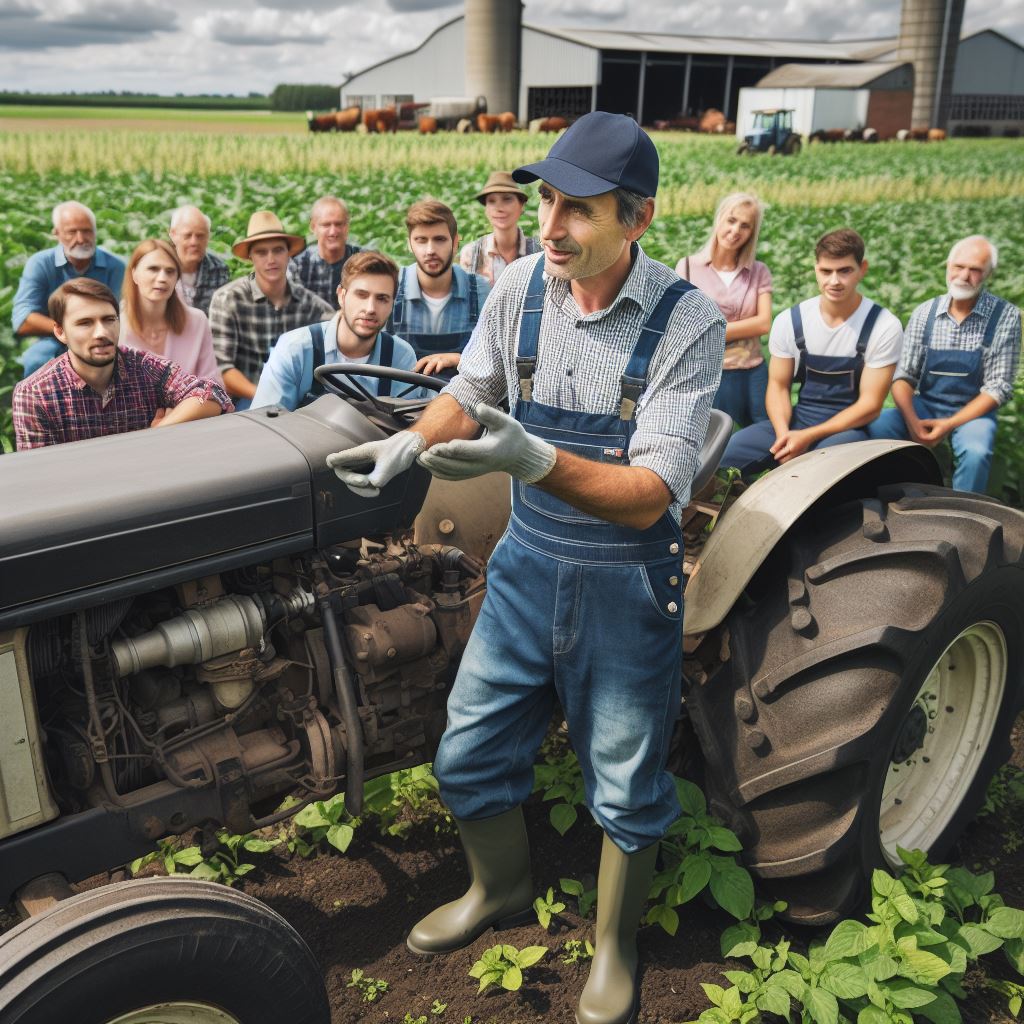Introduction
In today’s blog section, we will explore the concept of farm-to-table and its significance.
Farm to table refers to the direct sourcing of food from local farms, promoting freshness and sustainability.
This practice is vital as it supports local agriculture, reduces carbon footprint, and ensures healthier food options for consumers.
Farm-to-table seminars for beginners aim to educate individuals about the benefits and techniques of incorporating this practice into their daily lives.
These seminars provide a platform to learn about organic farming, sustainable practices, and how to source ingredients locally.
By attending these seminars, beginners will gain knowledge on cooking with seasonal produce, understanding food labels, and supporting local farmers.
Farm to table seminars also emphasize the importance of reducing food waste, promoting community engagement, and strengthening the connection between consumers and the food they consume.
The shift towards farm-to-table practices not only benefits individuals and communities but also contributes to a more sustainable and environmentally conscious world.
So let’s dive deeper into this exciting topic and discover how farm-to-table can transform our relationship with food.
Benefits of Farm-to-Table Seminars
Attending farm-to-table seminars for beginners can offer numerous advantages, ranging from increased awareness of where our food comes from to supporting local farmers and communities.
Let’s explore the benefits in detail:
A. Increased awareness of where food comes from
- Participants gain a deeper understanding of the journey their food takes from farm to table.
- They learn about the different stages involved in the production and distribution of food.
- By witnessing the process firsthand, they develop a sense of appreciation for the farmers and their hard work.
- This awareness encourages participants to make more informed choices about the food they consume.
- Understanding the source of our food can also create a greater connection to nature and the environment.
B. Encouragement of sustainable farming practices
- Farm to table seminars promote sustainable farming techniques that prioritize environmental preservation.
- Attendees learn about organic farming methods, crop rotation, composting, and the use of natural fertilizers.
- These practices help reduce the harmful impact of conventional farming on the land and surrounding ecosystems.
- By spreading knowledge about sustainable practices, seminars contribute to a more eco-friendly food system.
- Supporting sustainable farming helps preserve biodiversity and safeguards the health of future generations.
C. Promotion of healthier eating habits
- Farm to table seminars emphasize the importance of consuming fresh, nutritious, and whole foods.
- Participants learn about the benefits of a diet rich in fruits, vegetables, and locally sourced ingredients.
- They discover new recipes and cooking techniques that prioritize natural flavors and minimal processing.
- By understanding the nutritional value of different foods, attendees are empowered to make healthier food choices.
- These seminars inspire individuals to adopt a balanced and wholesome approach to their everyday meals.
D. Support for local farmers and communities
- Farm to table seminars serve as a platform for connecting consumers with local farmers and producers.
- Through these interactions, attendees develop a direct relationship with the people who grow their food.
- By purchasing locally sourced products, individuals contribute to the growth and sustenance of small-scale farmers.
- This support helps create a thriving local economy and strengthens community bonds.
- Additionally, by reducing the reliance on long-distance food transportation, seminars promote energy conservation.
In fact, attending farm-to-table seminars offers a multitude of benefits.
From gaining awareness about food sources and sustainable farming practices to promoting healthier eating habits and supporting local communities, these seminars play a crucial role in fostering a more sustainable and conscious food culture.
Read: Fresh on Your Plate: The Farm-to-Table Path
Types of Farm-to-Table Seminars
A. Introduction to organic farming
One of the most popular farm-to-table seminars is the introduction to organic farming.
Transform Your Agribusiness
Unlock your farm's potential with expert advice tailored to your needs. Get actionable steps that drive real results.
Get StartedIt provides an in-depth understanding of the principles and techniques of organic agriculture.
Participants learn about the importance of soil health, natural pest control methods, and the use of environmentally friendly farming practices.
Experienced farmers guide beginners through the process of transitioning from conventional to organic farming, ensuring a successful and sustainable farming experience.
B. Understanding local food systems
Another crucial aspect of the farm-to-table movement is understanding local food systems.
This seminar explores the intricate network of farmers, distributors, and consumers that contribute to a healthy and thriving community.
Participants gain insights into the economic, social, and environmental benefits of supporting local food systems.
They learn about the challenges faced by small-scale farmers and the impact of their choices on the local economy and environment.
C. Seasonal cooking and meal planning
Eating seasonally is not only beneficial for our health but also for the environment.
This seminar focuses on the importance of cooking with seasonal ingredients and provides practical tips for meal planning based on the availability of fresh produce.
Participants learn how to create delicious and nutritious meals using locally sourced fruits, vegetables, and herbs.
They also discover the art of preserving seasonal produce to enjoy their favorite flavors throughout the year.
D. Gardening for beginners
Starting a garden can be a rewarding experience, and this seminar is designed specifically for beginners.
Participants learn the basics of soil preparation, seed selection, planting techniques, and proper garden maintenance.
Experienced gardeners share their knowledge and provide valuable tips to ensure a successful harvest.
Whether participants have a small backyard or limited space, they will discover creative ways to grow their own fresh produce and connect with nature.
E. Sustainable livestock and poultry practices
For those interested in raising animals for food, this seminar focuses on sustainable livestock and poultry practices.
Participants learn about ethical and humane treatment of animals, proper housing and feeding techniques, and the benefits of pasture-raised meat.
Experts in animal husbandry guide beginners through the process of raising animals in a sustainable and responsible manner.
They emphasize the importance of biodiversity, animal welfare, and creating a positive impact on the environment.
Attending farm-to-table seminars provides beginners with the necessary knowledge and skills to embrace sustainable and organic farming practices.
Whether it’s learning about organic farming principles, understanding local food systems, exploring seasonal cooking, starting a garden, or raising livestock ethically, these seminars offer a holistic approach to sustainable agriculture.
By incorporating these practices into their daily lives, beginners can contribute to a healthier and more sustainable food system for themselves and their communities.
Read: Farmers & Chefs: Partners in Fresh Food
Components of Farm-to-Table Seminars
A. Hands-on activities
1. Visiting local farms or farmers’ markets
One of the key components of farm-to-table seminars is the opportunity to visit local farms or farmers’ markets.
Showcase Your Farming Business
Publish your professional farming services profile on our blog for a one-time fee of $200 and reach a dedicated audience of farmers and agribusiness owners.
Publish Your ProfileThis allows participants to see where their food comes from and learn about the different farming practices in their community.
2. Growing herbs or vegetables
Another hands-on activity that is often included in these seminars is growing herbs or vegetables.
Participants are taught how to start their own garden and are given the chance to cultivate their own produce.
3. Learning basic cooking techniques
Participants are also taught basic cooking techniques that are essential for farm-to-table cooking.
This includes learning how to properly prepare and cook fresh ingredients in order to highlight their flavors.
B. Educational sessions
1. Guest speakers from the farming and culinary industry
One of the highlights of farm-to-table seminars is the opportunity to listen to guest speakers from the farming and culinary industry.
These experts share their knowledge and experiences, providing valuable insights into sustainable farming and culinary practices.
2. Workshops on sustainable farming methods
Another important component of these seminars is workshops on sustainable farming methods.
Participants learn about environmentally-friendly practices such as organic farming, crop rotation, and composting.
3. Demonstration of farm-to-table meal preparation
During these seminars, there are often demonstrations of farm-to-table meal preparation.
Participants get to witness firsthand how fresh ingredients can be transformed into delicious and nutritious meals.
Overall, farm-to-table seminars for beginners consist of hands-on activities and educational sessions.
These components provide participants with the knowledge and skills to become more connected to their food sources and make informed choices about the food they consume.
Read: Eating Local: A Deep Dive into Benefits

How to Find Farm-to-Table Seminars for Beginners
Finding farm-to-table seminars for beginners can be an exciting and rewarding experience.
These seminars provide valuable knowledge and skills for individuals who are interested in learning more about sustainable food practices.
In this section, we will explore various avenues to find these informative and inspiring events.
A. Local community organizations and farmers
- Start by reaching out to local community organizations such as food co-ops, farmers markets, and community gardens.
- These organizations often host or organize farm-to-table seminars as part of their commitment to sustainable food systems.
- Local farmers who practice sustainable farming methods can also be great resources as they may offer workshops or seminars on their farms.
- Contact these farmers and inquire about any upcoming events or if they can recommend other seminars in the area.
B. Agricultural extension offices
- Agricultural extension offices are government agencies that provide resources and support to farmers and the general public.
- Many extension offices organize seminars and workshops on a variety of agricultural topics, including farm-to-table practices.
- Visit your local extension office or their website to find out about upcoming seminars and events.
- These seminars are often tailored to beginners and provide hands-on learning opportunities.
C. Online resources and directories
- The internet is a treasure trove of information on farm-to-table seminars.
- Websites like LocalHarvest.org and SustainableTable.org offer directories of upcoming seminars and workshops.
- These websites allow you to search for events by location, making it easier to find seminars in your area.
- Online forums and discussion boards related to sustainable food practices may also provide information on upcoming seminars.
D. Social media groups and events
- Joining social media groups focused on sustainable agriculture and farm-to-table practices can be another way to find seminars.
- Facebook groups, for example, often host and promote local events, including seminars for beginners.
- Check out events posted on platforms like Meetup.com, which offer a variety of gatherings centered around sustainable food education.
- Social media platforms provide a convenient way to stay updated on upcoming events and connect with other individuals interested in farm to table practices.
Finding farm to table seminars for beginners is all about exploring different avenues and utilizing available resources.
Whether through local community organizations, agricultural extension offices, online directories, or social media groups, there are plenty of opportunities to learn and connect with like-minded individuals.
Start your journey towards sustainable food practices today!
Read: Traceable Eats: Knowing Your Food’s Story
Explore Further: Organic Farming Meetups Across the USA
Conclusion
A. Recap of the importance of farm-to-table practices for beginners
Throughout this blog section, we have highlighted the significance of farm-to-table practices for beginners in the culinary world.
Learning about the origin of our food not only enhances our knowledge but also promotes a healthier lifestyle.
B. Encouragement to attend farm-to-table seminars
If you are a beginner looking to expand your knowledge and enhance your cooking skills, attending farm to table seminars is highly recommended.
These seminars provide valuable insights and practical tips to help you become more mindful of your food choices.
C. Final thoughts on the benefits of incorporating farm-to-table practices into everyday life
Incorporating farm to table practices into our everyday lives has numerous benefits.
It supports local farmers, promotes sustainability, enhances the quality and taste of our meals, and fosters a deeper connection with nature and our food sources.
Embracing these practices can lead to a healthier, more fulfilling lifestyle for beginners and seasoned chefs alike.




